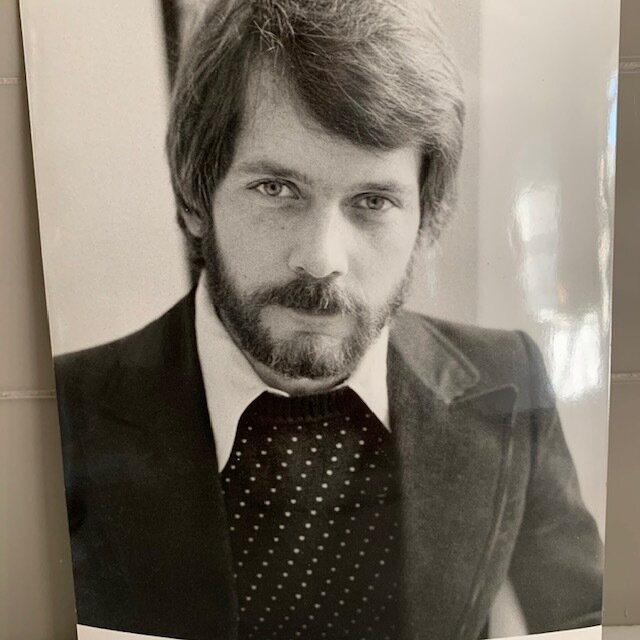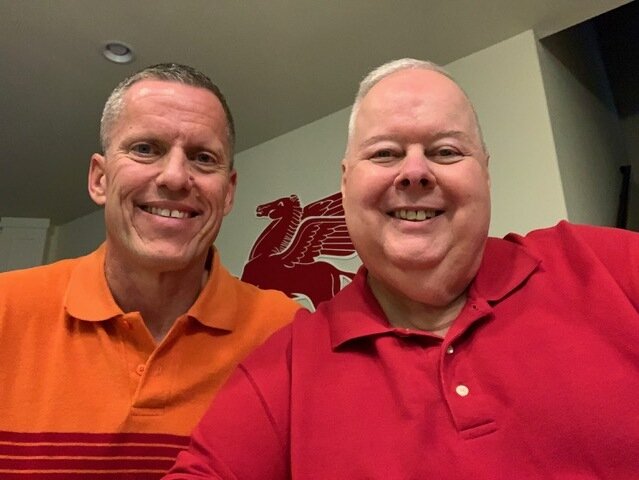Another Story®
How it started, the short version.
Aubin & Mark Petersen
My husband, Mark, and I were greatly moved to hear that our young neighbor had been kicked out of his home when he told his parents he was gay and couldn’t and wouldn’t be able to change. With my background in LGBTQ studies at Brite Divinity School I felt compelled to research the need for a safe space for LGBTQ+ persons, their siblings, parents, friends, allies and community to have dialogue about questions and topics of interest. The first invitation was for a potluck dinner and movie, For The Bible Tells Me So, followed by discussion of the film and a personal story of coming out. With twenty-two people in attendance by invitation only, the group decided they wanted to meet each month, except December, on the third Sunday, at 5:00p.m. for a potluck dinner, to share individual stories and dialogue with professionals on topics chosen by the group. That was September 25, 2011. We are starting our 10th year.
The First Story that inspired my studies…
Paul Dwyer & his Father, Dr. Eddie Dwyer
Dr. Dwyer was a Professor of New Testament at Baylor University, and ordained Southern Baptist Minister
Growing Up Southern Baptist
I grew up in an exceptionally loving Southern Baptist family. My Dad was a minister and a professor of religion at Baylor University in Waco, Texas, and my Mom the university’s credit manager. Church was the center of my life. I participated in Sunday School, Baptist Training Union, Vacation Bible School, and Royal Ambassadors for Christ, as well as revivals and retreats. I was happy and secure in my family and my belief in God.
Everything felt special, particularly when Dad baptized me, when I was often called to lead prayers, and when I was given the “Outstanding Christian Boy” award during my senior year of high school, in 1962.I always thought I would continue to lead this life and become a missionary.
Realizing I Was Different
My life was an ideal world in every way except one – early on, I had a nagging realization that I was different. I didn’t know exactly what it was, nor did I have a name for it. I was fascinated by guys but had no idea what to do with those attractions. Eventually, I began to suspect I might be “homosexual” and the possibility scared me. The word stood for something dirty, disgusting, and sinful, the ultimate derogatory putdown, the unspeakable sin, condemned by both church and society. As a consequence, whenever I felt an attraction, I blocked it and denied it.
As I entered my teenage years, I became more conflicted and frustrated. I was too ashamed to ask for help. In both high school and college, I put on what I believed was an acceptable heterosexual front. I dated women, and although I cared for them and had many fun times, I felt no sexual or romantic connections. And without these connections, I was frustrated and lonely. And, of course, I couldn’t act on my interests in guys or tell anyone about them.
To compensate for being gay, I tried to be the “best little boy” in the world. I had to prove myself by being popular, earning good grades, pleasing everyone, and getting recognition. I was fortunate to win a few class and fraternity elections and earn a few honors. But living a lie was taking a psychological toll.
Experiencing Baylor Life
I’d always known I’d attend Baylor and was excited when my freshman year began in 1962. Almost sixty years later, I still feel fortunate to have had a high quality education and remain grateful for the outstanding and progressive professors who were positive influences in my life. They challenged my thinking and gave me new perspectives. However, even though the Baylor community had been a safe haven for me when I was growing up, as a student there I no longer felt safe; I knew I had to stay in the closet and ignore homophobic remarks, just as I had in high school.
The simple reality was that Baylor was not a safe place for gays. There, for the first time in my life, I was called faggot. Not only that, it was the president of my fraternity who spoke the word, in front of other members of the fraternity. I froze when he said it, too embarrassed to respond, as some of the members giggled and others sat silently.
Just as bad, or maybe worse, was the day the Dean of Women came to my speech class, unannounced. Her sole purpose in coming was to tell the class that homosexuality was against Baylor’s policy and that, if discovered, it would be punished. As she spoke, her eyes kept darting back to me. I was utterly mortified and wanted to disappear. She also said that Baylor maintained a list of known and suspected homosexuals, who were watched and subject to expulsion. When she left the room, as abruptly as she had entered, the silence was deafening.
Other events were similarly disturbing. Some months after the dean’s pronouncement, I was chatting with a male friend one night in my car, on campus. I looked up to see two Baylor police standing on each side of my car with flashlights pointed inside. After asking what we were doing, they ordered us to leave. More and more, I realized Baylor was becoming an uncomfortable place for me.
I learned to cover my tracks. When visiting Dallas gay bars, fearing exposure, I did not park in their lots; I knew that the police were in the habit of writing down license plates, which could lead to being named in a newspaper expose. In Waco, the same fear prevailed, but with a twist. Baylor officials periodically came unannounced to the city’s only gay bar, searching for students. Fortunately, the doorman always managed to delay them while sending a signal to students to scramble to a hiding place set up precisely for that purpose.
Life started looking up when I met other gays in Washington, D.C., where I lived during a semester in 1963 working for Congress. They encouraged me to be honest and open. And then, the following summer I met more gays while working in the Texas Pavilion at the New York World’s Fair. It was terrific to find others like me who were open and happy.
I graduated with mixed feelings about my beloved Baylor. Its non-inclusionary message flew in the face of my concept of Christian love. It was no coincidence that I had lost interest in organized religion by then.
And shortly after graduation, I had another experience that further disillusioned me toward Baylor. I came out to the boy who had been my best friend at Baylor, and a popular cheerleader.He rejected me.Not only that, when I told him, he turned his back on me without saying a word and walked away.I never heard from him again.
Read More
Read: The Bible and Homosexuality: Life Beyond Tradition
The inspiration for Another Story(R) - Levi Bohanan
Levi Bohanan (R) & Zac Petkanas

















